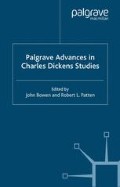Abstract
Charles Dickens and Sigmund Freud were strangers, yet they seem to have known each other intimately. Joined in a uniquely humane agenda, they sought understanding of the spoken and unspoken desires of human beings in relation to one another, to an unknowable past, a haunted present, a mortgaged future. Dickens and Freud were observers of human life and crafters of bold narratives of character.
The point about both Dickens and Freud and why one likes to see the grand sweep of their lives is that they’re both essentially heroic characters, Freud a hero of thought and Dickens a hero of literature. Moreover, both were aware that they were heroes, that they had heroic destinies and heroic mythological structures in their lives
Steven Marcus1
Not only would the echoes die away, as though the steps had gone; but, echoes of other steps that never came would be heard in their stead, and would die away for good when they seemed close at hand.
Charles Dickens2
Access this chapter
Tax calculation will be finalised at checkout
Purchases are for personal use only
Preview
Unable to display preview. Download preview PDF.
Notes
Steven Marcus, “A Biographical Inclination,” in Samuel H. Baron and Carl Pletsch, eds., Introspection in Biography: The Biographer’s Quest for Self-Awareness (Hillsdale, NJ: The Analytic Press, 1985), p. 303.
Charles Dickens, A Tale of Two Cities, Andrew Sanders, ed., Oxford World’s Classics (New York: Oxford University Press, 1998), 2:6, 116. All subsequent quotations refer to this edition and will be cited parenthetically in the text.
Albert D. Hutter, “Psychoanalysis and Biography: Dickens’ Experience at Warren’s Blacking,” University of Hartford Studies in Literature 8 (1976): 23–37, 25–6.
Ibid., p. 23.
Charles Dickens to John Forster, 25 August 1859, in The Letters of Charles Dickens, ed. Madeline House, Graham Storey, et al., The Pilgrim/British Academy edition, 12 vols. (Oxford: Clarendon Press 1965–2002), 9:112–13.
See especially Georg Lukács, The Historical Novel, Hannah Mitchell and Stanley Mitchell, trans. (London: Merlin, 1982).
Charles Dickens, David Copperfield, Nina Burgis, ed. Oxford World’s Classic (Oxford: Oxford University Press, 1992), ch. 1, p. 49.
Charles Dickens, Bleak House, Stephen Gill, ed., Oxford World’s Classics (Oxford: Oxford University Press, 1998), ch. 1, p. 11.
Sigmund Freud, “Remembering, Repeating, and Working-Through: Further Recommendations on the Technique of Psycho-Analysis II,” Standard Edition 12:150, emphasis in original.
Ibid., p. 154.
On trauma and history, see Cathy Caruth, Unclaimed Experience: Trauma, Narrative, and History (Baltimore: Johns Hopkins University Press, 1996).
On Freud’s relationship to the literary, see Marjorie Garber, Shakespeare’s Ghost Writers: Literature as Uncanny Causality (New York: Methuen, 1987).
Lynn Hunt, The Family Romance of the French Revolution (Berkeley: University of California Press, 1992).
For a wonderful reading of Dickens’s “domestication,” see Hilary Schor, “Hard Times and A Tale of Two Cities: The Social Inheritance of Adultery,” in Dickens and the Daughter of the House (Cambridge: Cambridge University Press, 1999), especially pp. 89–95.
Carolyn Williams, “Prison Breaks,” paper presented at the Dickens Universe, University of California, Santa Cruz, 1 August 2004.
Editor information
Editors and Affiliations
Copyright information
© 2006 Palgrave Macmillan, a division of Macmillan Publishers Limited
About this chapter
Cite this chapter
Dever, C. (2006). Psychoanalyzing Dickens. In: Bowen, J., Patten, R.I. (eds) Palgrave Advances in Charles Dickens Studies. Palgrave Advances. Palgrave Macmillan, London. https://doi.org/10.1057/9780230524200_11
Download citation
DOI: https://doi.org/10.1057/9780230524200_11
Publisher Name: Palgrave Macmillan, London
Print ISBN: 978-1-4039-1286-2
Online ISBN: 978-0-230-52420-0
eBook Packages: Palgrave Literature & Performing Arts CollectionLiterature, Cultural and Media Studies (R0)

